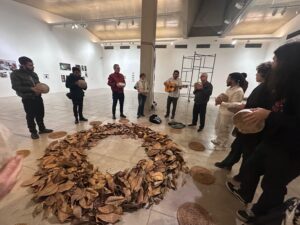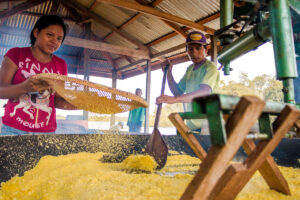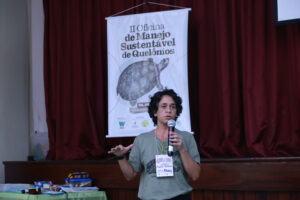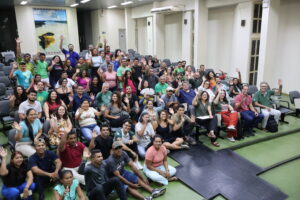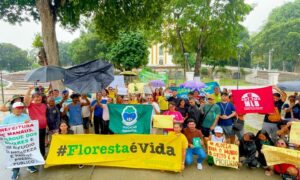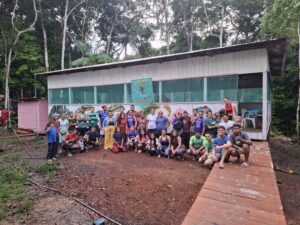Normative Instruction No. 001, dated May 14, 2025, recognizes the Fishing Agreement and establishes rules for managing the aquatic environments of the municipality of Itamarati, Amazonas.
By Maria Cunha
The agreement, which had been in the works for over ten years by fishers from both the communities and the town, gained significant momentum over the past three years. In 2024, Itamarati celebrated the formalization of its first Fishing Agreement through an assembly that brought together local communities, organizations, partners, and State representatives. This was a key moment for the territory to strengthen its sense of community, promote dialogue among various stakeholders, respect traditional knowledge, and encourage effective participation—marking a new chapter in territorial governance.
And the progress doesn’t stop there! After several bureaucratic and legal procedures involving state agencies, on May 14, through Normative Instruction No. 001 of 2025 (State of Amazonas), Itamarati reached another decisive milestone in its collective journey: the final approval of the Fishing Agreement by the Amazonas regulatory body, SEMA – the State Department for the Environment. This moment officially marks the municipality’s entry into a new era of participatory management, in which local communities and stakeholders, with technical and institutional support, take on an active role in caring for the resources that sustain their way of life.
João Vitor Campos-Silva, president and general coordinator of the Juruá Institute, emphasized the importance of this agreement for the region:“The meetings with the communities began in 2014, exactly eleven years ago. Many of them were held by candlelight in people’s homes, because at that time, neither the communities nor we had electricity. There were countless cases of violence against riverine people—local ‘bosses’ preventing communities from feeding themselves, countless threats of violence against those who began organizing for territorial autonomy and food security. The approval of this agreement means a great deal to the Institute because it testifies to Amazonian time. (…) Today is a very important day and one that should be celebrated, because today we saw a seed we nurtured with great care, effort, and commitment finally sprout. It was cultivated by the local communities of Itamarati. We must tend to this little plant with love, because the work is only beginning. It still needs to grow roots and establish itself to become a mighty tree that will bear many fruits across the territory.” — said João, also known as JB.
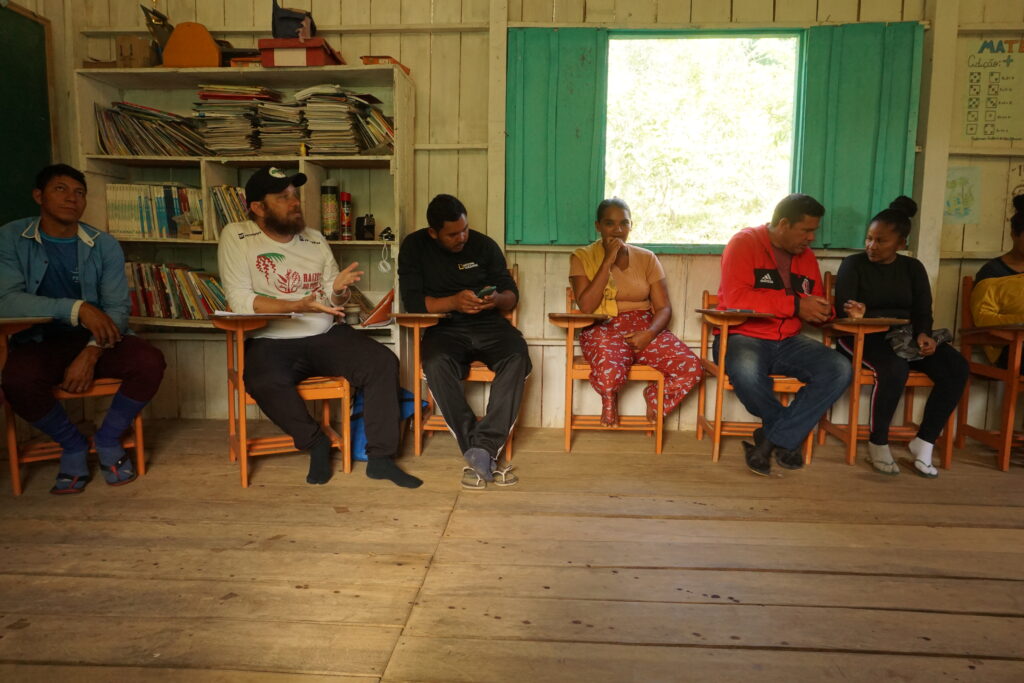
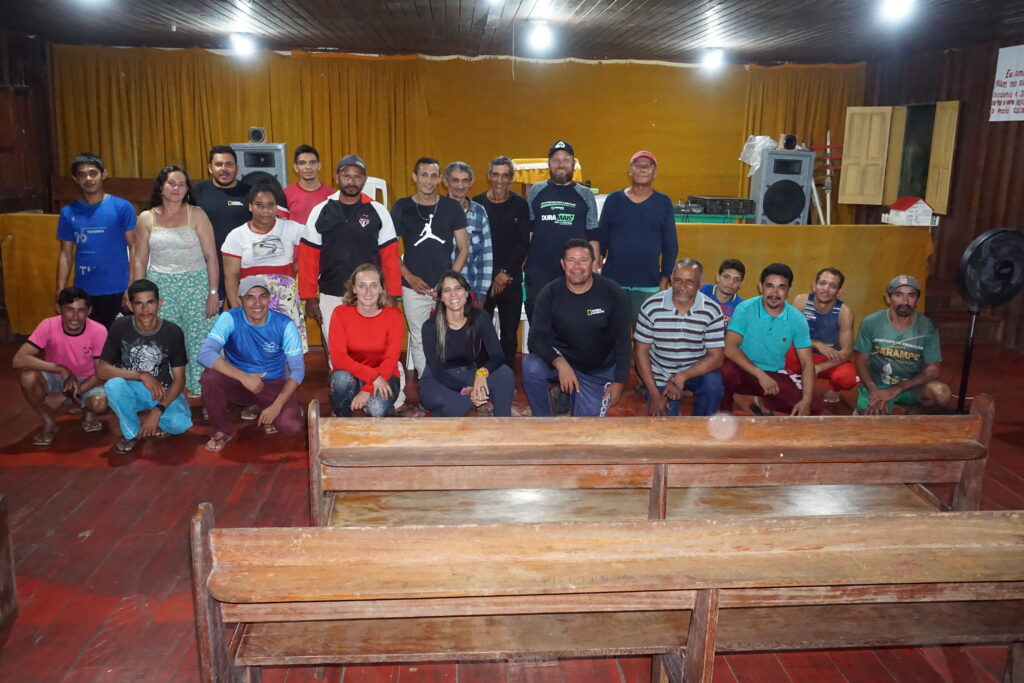
The Fishing Agreement strengthens the sense of belonging and autonomy within the communities, showing that when the people of the territory have an active voice, the results are long-lasting and positive. The direct involvement of families in surveillance, monitoring, and rule-setting fosters a collective sense of responsibility—toward nature and one another. At a time when the Amazon faces numerous external threats, initiatives like this reaffirm that the path to sustainability lies in listening, respect, and empowering those who live in and care for the forest every day.
Bezaliel Gentil da Costa, president of the Z-59 Fishing Colony of Itamarati and a contributor to the process, emphasized the importance of partnerships and highlighted the role of the Juruá Institute in helping establish the agreement: “This achievement is an important milestone for the sustainable management of fishery resources in our region and reflects the Juruá Institute’s commitment to equitable development and social justice. It’s worth noting that this success is not the result of a one-time effort, but of more than ten years of hard, persistent, and dedicated work (…). The approval of the Fishing Agreement is a testament to the effectiveness and resilience of this effort, which has been fundamental in improving the quality of life for riverine communities and ensuring the sustainable management of natural resources.” Gentil also underscored the agreement’s importance for the region: “The approval of the Fishing Agreement paves the way for more participatory and responsible natural resource management, ensuring food security and environmental sustainability for future generations”, said the president of the Colony.
Nerinho São Bento, president of the Environmental Association of Farmers, Extractivists, Fishers, and Rural Producers of Itamarati (AAEPPRI), who coordinated the initiative alongside other partners, also emphasized the importance of this moment for the territory: “It’s truly moving to know that we can now honor the many years of care the communities have shown toward the environment. This is a real improvement in our lives—let’s sum it up as a better quality of life for everyone. (…) Congratulations to all of us who have been in this fight, and congratulations to the Juruá Institute team, who have always supported us in these struggles”, celebrated Nerinho, a member of the Management Committee of this Fishing Agreement and president of the association representing the riverine communities.
In conversations with Eduardo Muhlen, known as Duka, Territorial Governance and Socio-Bioeconomy Coordinator at the Juruá Institute, he outlined the next steps following the agreement’s approval: “With the fishing agreement now recognized, the next step is to implement it with the communities, starting with a request for an experimental quota for pirarucu (arapaima) management. For five years, the territories have been protected and fish stocks monitored, with clear signs of recovery. This year, we organized meetings to plan an experimental fishing initiative and support AAEPPRI, the Z-59 Fishing Colony, and the Itamarati Department of the Environment, who will now lead the monitoring of the agreement, lake surveillance, and annual assessments—always with the support of the Juruá Institute and the partners of the Mid-Juruá Territory”, explained Duka.
A new chapter written by many hands—with courage, patience, and a vision for the future. This is a concrete example that sustainable development in the Amazon is possible when built through dialogue, participation, and respect for life. This is only the beginning of a new story, where communities take on the role of guardians of the rivers and protagonists of their own destiny.
Sharing his thoughts, Natanilson Lopes, Secretary of the Environment for the Municipality of Itamarati, emphasized how the agreement could transform the territory: “This fishing agreement is very important for us. It came to organize fishing, protect the fish, and ensure our livelihoods. It strengthens our governance and brings visibility to a territory that had long been forgotten. It also contributes to the quality of life of our people and to the preservation of biodiversity. I’m grateful to all the organizations that supported us in building this”, highlighted the Secretary.
This is a milestone that strengthens collective identity, recognizes the central role of local populations in conserving the Amazon, and inspires other territories to follow the same path—one of care, listening, and building sustainable solutions from the ground up.
What is being celebrated is more than a tool for managing fisheries. It is the triumph of community organization, hope, and the conviction that the future of the Amazon lies in the hands of those who live in it, care for it, and stand firm in its defense.

